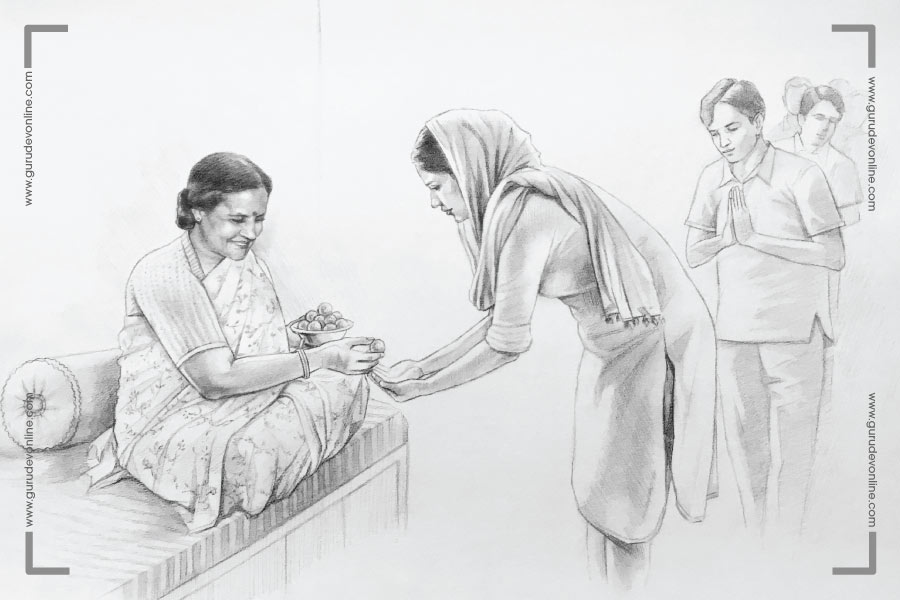PHILOSOPHY & PRACTICES

Gurudev observed certain days of the year in specific ways.
BADA GURUVAR
A Thursday of the month is designated as Bada Guruvar. It is usually the first Thursday following a night of no moon.
On this day, seva is performed at sthans across the country. Visitors are served tea and, if possible, khichdi. They are not permitted to offer anything in return since nothing is accepted in exchange for seva rendered. However, visitors to the main sthan in Gurgaon can offer sugar-coated barley grains (phuliyan) and sugar pops (pattisa). After being energised at the sthan, these sugary offerings are returned to them.
During Gurudev’s time, around 50,000 people would come to seek his help on Bada Guruvar. He met all of them for a few seconds or more. Many didn’t have the time to detail the support they needed, but somehow or the other, they would receive the help or healing sought.
MONDAY FASTS
Gurudev would fast once a week on Mondays. On this day, he lived only on liquids till nightfall.
In his early years as a mahaguru, he would break his fast with water, yoghurt, and jaggery followed by potato subzi and rotis. Before consuming his share of the water-yoghurt-jaggery combo, he divided it among a cow, a crow, a dog, and a houseguest. Eventually, he abandoned this method. These days, the Monday fast is broken at sunset only with a meal of potato subzi and rice or rotis. Devotees and disciples can eat fruits throughout the day if they so desire.
Gurudev recommended fasting as a form of tapasya. By sacrificing a meal owed to you by destiny, you willingly give it up for another being. Moreover, fasting once a week rests the digestive system, releases toxins, repairs body cells, accelerates metabolism and improves brain health. Furthermore, since salt and cereals are not consumed, body secretions are reduced, and the mind is freer from activity and stress.
Mondays are days when the moon’s rays are dominant. The lunar rays affect both water and the mind. Our bodies are nearly 70% water, so these rays influence the body-mind complex. Fasting on Mondays is therefore beneficial to physical and mental health.
Ravi ji recalls the mahaguru’s words, “Mondays are dedicated to your isht, so you should do as much paath as you can on this day”. The isht being referenced is Shiv in the unmanifested state.
SPECIFIC FASTS
Gurudev also recommended the practice of fasting on Ganesh Chauth and Mahashivratri.
Ravi ji recalls his guru explaining that fasting is a practice of self-restraint, intended to exercise control over food intake, speech, and the senses. Fasting increases the potency of magnetic qualities in humans. As a result, one can absorb more energy from the earth or atmosphere. Fasting is an effective way to replenish energy for those with higher holding capacity.

Mataji distributes ladoos on Ganesh Chauth
Ganesh Chauth
Ganesh Chauth is usually celebrated in January when the weather is cold and wintry. Devotees and disciples fast without food or water from sunrise to moonrise on this day.
Jaggery-sesame ladoos and jaggery tea are served to break the fast. These are offered to visitors at the sthan or made at home.
The period from Diwali to Mahashivratri is referred to as the Shakti period. During this time, a person’s masculine energy principle becomes passive, while the feminine energy principle becomes dominant. Aware of this technicality, practising male spiritualists prefer to keep a low profile in this period, limiting their social interaction with women to a necessary minimum.
On Ganesh Chauth, a third of the masculine principle reawakens, allowing a man to reclaim a part of the energetic spark that augments his being. Finally, on Mahashivratri, the masculine principle of a man’s energy is fully awakened and reasserts its dominance.
Mahashivratri
This day falls forty-one days after Ganesh Chauth every year, usually in February or March.
Those fasting eat before sunrise and do not consume any food or water until midnight. They break their fast with salted fried potatoes and lemon-pepper black tea, either at the sthan or home. This fast is more rigorous than Ganesh Chauth because it lasts a few hours longer.
During Gurudev’s time, the queues would stretch for several kilometres. It took three to four days to ensure that all devotees had met with the mahaguru and received his blessings.
Mahashivratri is celebrated at all sthans, but many devotees from across the world congregate at the Gurgaon sthan during this spiritual festivity. The sevadaars are in charge of the visitors’ food and lodging. Food is prepared in large quantities, and langar is served to all visitors from two days before to two days after Mahashivratri.
Following a closer examination of Gurudev’s life, I discovered that almost every occasion became an opportunity for him to serve food to countless others.

Gurudev blesses and returns a coconut wrapped in a cloth to a devotee,
GURU PURNIMA
Every year, usually in July, a day is ritually dedicated to the guru, known as Guru Purnima. It is a day to honour your guru for his presence in your life and contribution to your spiritual growth.
For Gurudev, this day marked the celebration of a custom. His devotees offered him a coconut wrapped in a yellow handkerchief, which he blessed and returned. The coconut is commonly associated with the human head, and offering it to your guru implies surrendering to his grace. The mahaguru let his disciples present him with nine clothes or accessories. Alternatively, he felt the custom would be complete if we wrote ‘nau vastr’ (nine clothes) on a yellow handkerchief and offered that instead. He allowed a few disciples to wash his feet and drink the water, which contained his energy and was extremely potent. Many disciples found the energised water to be an elixir, as it raised their consciousness.
Thousands of devotees flocked to have their coconuts blessed, and some fasted on fruits until they could pay their respects. Sweetened saffron rice and mangoes were served to them at the sthan.
DUSSEHRA, DHANTERAS AND DIWALI
According to the lunar cycle, the twenty days from Dussehra to Diwali are the darkest of the year. As a guru in the making, Gurudev would do a lot of paath during this time, sleep on the ground, wear the same clothes without changing, and eat light, if at all. Later, he stopped practising this himself but suggested it to a few disciples.

Devotees get a silver coin blessed by the Mahaguru on Dhanteras.
Dhanteras
Dhanteras falls a day or two before Diwali. It is a day to express gratitude to the deity of wealth, Laxmi Devi, and request barkat (the luck to make your buck last longer).
On this day, the mahaguru’s devotees and disciples purchased a silver coin of Laxmi Devi and had it blessed by him.
A saffron or vermillion tilak is applied to the coin for forty-one nights from Diwali onwards. And a specific mantra is chanted to appease the deity’s energy and awaken the power of barkat that lies latent within each of us.
Diwali
Diwali is the darkest night of the year. The mahaguru suggested that we light diyas or oil lamps on this night, particularly at seven specific locations: water body, Tulsi plant, Peepal tree, road crossing, temple, cemetery, and our homes. Diyas are typically lit to appease specific energies.
Gurudev also suggested we stay awake on this night doing paath. Even though mantra-based meditation is essential on all days, its efficacy is significantly enhanced on certain days.
OTHER IMPORTANT DAYS
During an eclipse, the mahaguru advised abstinence from water and food, and suggested focusing on paath instead.
During the days of shraddh, he advocated feeding people and animals on behalf of our ancestors. Aside from that, other charitable acts can and should be performed in their name.
Contrary to the popular sentiment around birthdays, the mahaguru did not buy into this concept since he believed that the jivaatma is neither born nor dies. However, since his passing, his devotees have begun to observe Basant Panchami as his birthday. While the tradition of distributing sweetened saffron rice on this day dates back to Gurudev’s time, he only observed it as a day dedicated to Saraswati Devi, the deity of wisdom.